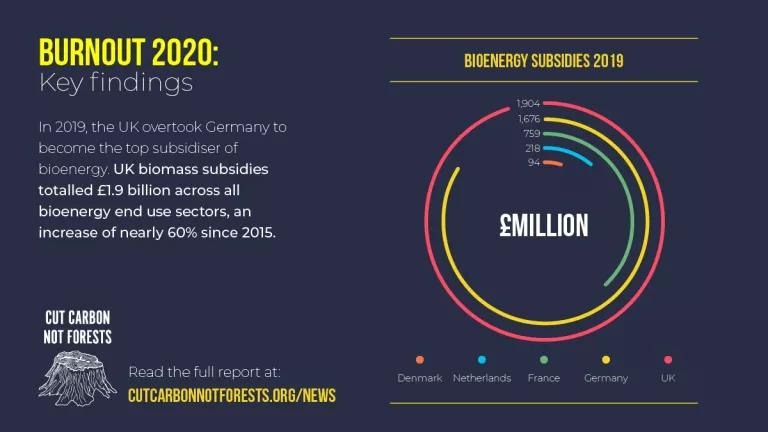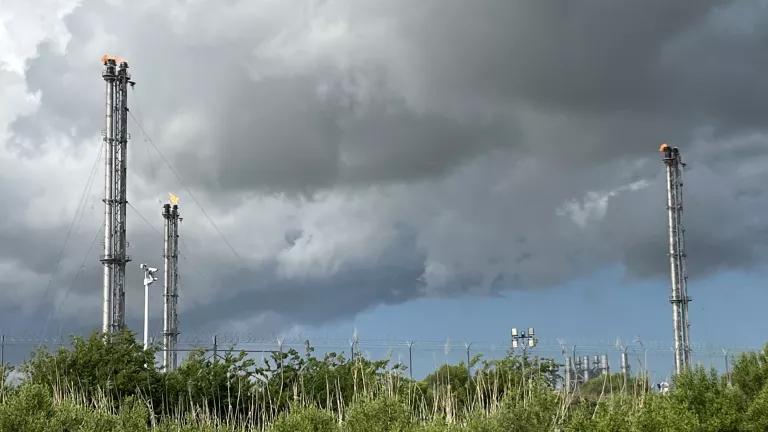The UK Must End Biomass Electricity Subsidies Now
If Boris Johnson’s government is serious about investing in a green future, it should start by ending support for a charcoal-grey past.

Part of NRDC's Year-End Series Reviewing 2020 Climate & Clean Energy Developments
The UK government made a series of historic announcements in 2020 that aim to put that nation at the forefront of efforts to end investments in dirty energy and bring about a truly green economic recovery. But, if Boris Johnson’s government is serious about investing in a green future, it should start by ending support for a charcoal-grey past.
While the Prime Minister’s “Ten Point Plan for a Green Industrial Revolution” features ambitious initiatives to expand native tree-planting and power every home in Britain with clean electricity from offshore wind in the next decade, it’s clear that the plan falls short of what’s needed to address our climate emergency. An immediate place to start is to scrap billions in dirty biomass electricity subsidies and invest the savings in real climate solutions like wind and solar.
No country in the world relies more heavily on biomass electricity than the UK—essentially replacing coal-fired power with wood-fired power in the same old, inefficient power stations like the Drax Power Station in North Yorkshire. But the practice is anything but green. It pumps more carbon into the atmosphere and degrades forests at the very moment reducing emissions and expanding forest carbon sinks is paramount.
Each year, Drax alone burns more wood for electricity than the whole of the UK produces, meaning it must import millions of tonnes of wood pellets from forests around the world to keep its massive boilers running. And because there is simply not enough supply of genuine forestry residues to meet such enormous wood fuel demand, Drax’s supply chain year after year includes whole trees, routinely sourced from clearcuts of mature hardwood and pine forests. These trees are cut down, ground up, then shipped across the ocean to be burned as fuel.
And the irony is, none of this would be possible without the massive public subsidies the biomass industry receives under the guise of supporting renewable energy. New data published just last week by NRDC reveals that the UK is now the top subsidizer of bioenergy in Europe. One in every five pounds the UK spent on renewables subsidies in 2018 went to bioenergy, rather than to wind, solar and other true clean energy.
Most of the UK’s bioenergy subsidies went towards support the burning of wood at Drax to generate electricity. In 2018-19, the UK Government spent roughly £1.5 billion to subsidize biomass electricity—more than the £1.35 billion and £550 million spent on onshore wind and solar respectively, despite the fact that onshore wind and solar are the cheapest way to provide true clean power to Britons today. Without this handout, biomass-burning power stations like Drax wouldn’t survive; in fact, it is cheaper to build new solar and wind projects in the UK than to run the UK’s existing biomass plants.
In its recent Renewables 2020 report, the International Energy Agency underscored how poorly biomass plants fare when they compete head-to-head with true clean and renewable energy sources. When biomass plants must compete against wind or solar in ““technology-neutral auctions” they rarely win, the IEA said. And the future is even grimmer, because of “limited cost reduction potential for bioenergy technologies.” In other words, solar and wind technologies keep falling in price, but it’s hard to bring radical cost reductions to the energy source of the Middle Ages.
At a time when the UK—and the world—faces a triple climate, nature and an economic crisis touched off by the COVID-19 pandemic, pressure is mounting on the Johnson government to end the harmful practice of subsidizing false climate solutions like biomass electricity. The good news is that the bulk of biomass subsidies are paid out under the Renewables Obligation Certificates scheme and can be redirected immediately at the government’s discretion. Under the current system, reduced spending on biomass electricity subsidies should automatically free up increased funding for new support for different and cleaner renewable electricity.
Change is coming to this outdated and unhelpful subsidy program, and our coalition's Cut Carbon Not Forests campaign, launched this year, is working to make sure that happens sooner not later.
A true green recovery is one that prioritizes the clean, low-cost and abundant climate solutions the UK already has, such as wind and solar. It also means protecting forests, which are the most efficient and powerful carbon-capture system on the planet. No technology that pumps more carbon into the atmosphere or destroys forests should be receiving billpayer funds. Burning trees for electricity does both. UK subsidies for biomass electricity must end now.


